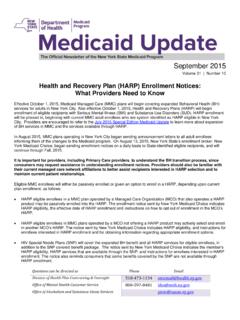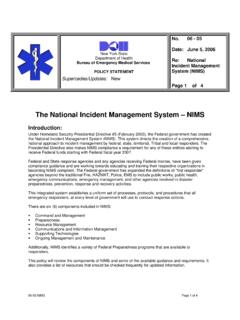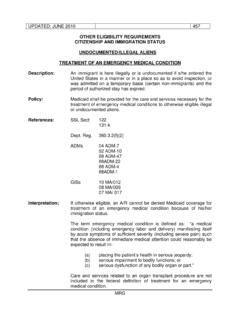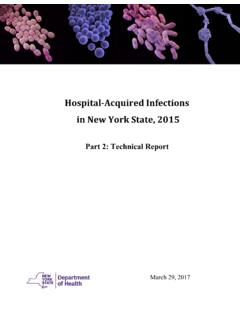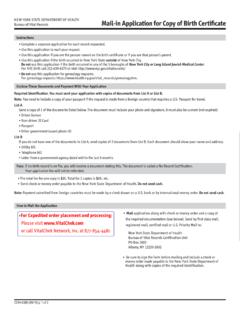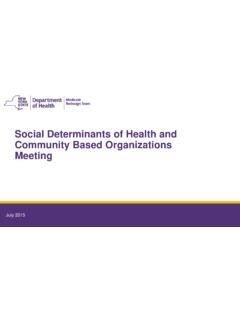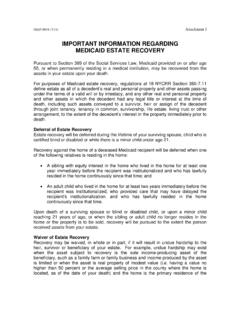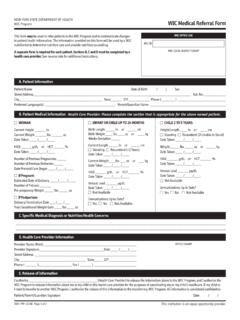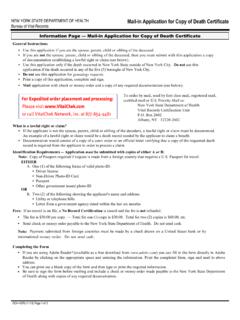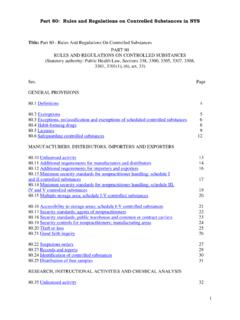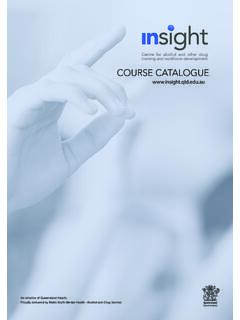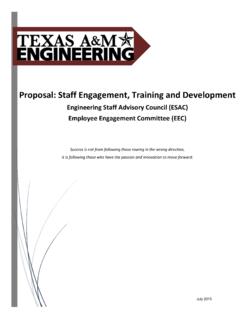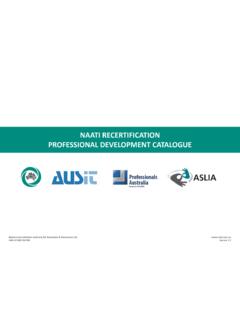Transcription of Training for Professionals: Working with Early ...
1 Training for Professionals: Working with Early Intervention Families **Indicates Early Intervention Professional Development Credits Toward the Provider Agreement Title Format Description Link to Training Developing This video focuses on strategies that professionals can use to ensure a family Video is on the DOH YouTube Meaningful feels engaged in developing their child's IFSP. Knowing that the more Channel: Individualized involved the family is in developing their child's IFSP, the more the plan Family Service Video makes sense to and is valued by the family. 8. Plans (IFSPs). through Family Engagement**. Under Part C of the Individuals with Disabilities Education Act (IDEA, 2004), the Early Intervention Program (EIP) provides supports and services for infants and toddlers with developmental delays and/or disabilities and their families. The Division for Early Childhood of the Council for Exceptional Self- Children (DEC) recommends practices that promote the active participation of https://onlinelearningmodules.
2 Family-Professional paced families throughout the Early intervention process. As such, professionals Partnerships**. module who work within the EIP need to develop trusting partnerships with the cat/?cat= Early -intervention families they serve. The overall purpose of this online learning module is to provide information about the components of an effective family-professional partnership, as well as strategies to support and strengthen these partnerships. An important element of Early intervention programs across the country is the emphasis on the family unit. Parents and/or caregivers are active players Strategies to Self- https://onlinelearningmodules. throughout the Early intervention process evaluation, sessions, meetings, Involve Parents in paced and transitioning to preschool. This module is intended to provide Early Early Intervention** module cat/?cat= Early -intervention intervention professionals with feasible strategies that can be used to increase parent involvement in sessions.
3 A key component of Early Intervention is the collaborative development of the individualized family service plan (IFSP). The IFSP includes both child and family outcomes which guide the types of services and supports that will be provided to the eligible child and their family. The purposes of this module are: Including Family Self- To understand what IFSP family outcomes are, and why they are https://onlinelearningmodules. Outcomes in the paced important IFSP** module To identify collaborative practices to develop meaningful family cat/?cat= Early -intervention outcomes To inform how to write measurable and meaningful family IFSP. outcomes. Training for Professionals: Working with Early Intervention Families **Indicates Early Intervention Professional Development Credits Toward the Provider Agreement Title Format Description Link to Training This webinar will cover how to effectively use Facebook groups to engage Go to Learning Management families.
4 The speaker will walk through how to create a group, invite Engaging Families Recorded System ( ) and members, create engaging posts with strong visuals, and utilize some of Through Facebook webinar / search in the course catalog Facebook's features to increase engagement. This webinar is intended for Groups** Video for course number: IFaCT- Early Intervention providers who may use Facebook groups to connect 2021-01. families to resources and/or to engage them with each other. Go to Learning Management Recorded The webinar helps to identify the key components to implementing effective System ( ) and Understanding the webinar / parent advocacy and educational support programs for families, to promote search in the course catalog Family Experience**. Video ongoing family engagement in their child's healthcare and education. for course number: IFaCT- 2021-07. As young children learn best through participating in their everyday routines, with familiar people, Early intervention services are provided in a child's natural environment to the greatest extent possible.
5 This is intended to Self- https://onlinelearningmodules. Natural increase exposure to same age, typically developing children, as well as paced Environments** generalization of skills taught during Early Intervention sessions. The overall module cat/?cat= Early -intervention purpose of this learning module is to inform families of what natural environments are so that they can make informed decisions, and advocate for what they want for their child and family. Training for Professionals: Working with children with developmental disabilities and their families **Indicates Early Intervention Professional Development Credits Toward the Provider Agreement Title Format Description Link to Training Cultural and Self- With the increasing diversity of our population, disconnects can occur https://onlinelearningmodules. Linguistic paced between providers and the children/families they Competency** module serve.
6 Cultural and linguistic competency increases access cat/?cat= Early -intervention to and acceptability of care, improves quality of care, and reduces disparities in outcomes for racially and ethnically diverse populations. Given the family- centered nature of Early intervention, it is essential that providers exercise cultural and linguistic competency in their practice. This module provides an overview of cultural and linguistic competency, as well as the role of cultural and linguistic competency of in Early intervention. Routines Based Self- Young children grow and develop in the context of their family. Early https://onlinelearningmodules. Interventions** paced intervention programs address this by providing intervention services in module natural environments and incorporating family routines into intervention cat/?cat= Early -intervention implementation. A naturalistic teaching method to Early intervention, Routines- Training for Professionals: Working with children with developmental disabilities and their families **Indicates Early Intervention Professional Development Credits Toward the Provider Agreement based Intervention, is one approach that can be used alone or in combination with other intervention approaches.
7 This module will outline assessment, planning, and implementation considerations for Routines-based Intervention. Making a Sensory Recorded This webinar will cover how to create and use a sensory kit as well as visual Go to Learning Management Kit and Using webinar / supports. Individualized sensory kits and visual supports can help children System ( ) and Visual Supports** video and families in the home, school, and community. During this webinar we will search in the course catalog explore the benefits of these supports, how to create individualized supports, for course number: IFaCT- and how to use them with families. 2021-02. Understanding Recorded This webinar focuses on understanding Autism and is designed for Early Go to Learning Management Autism** webinar / Intervention professionals. The course has three learning objectives: Review System ( ) and video context of Autism Spectrum Disorder (ASD) diagnosis; describe ASD search in the course catalog diagnostic criteria and evaluation process; and discuss family/provider for course number: IFaCT- interactions around ASD evaluation referrals.
8 2021-03. Parent/Child Self- This session will share the experiences from both a parent and clinician's https://onlinelearningmodules. Groups** paced perspective of facility-based parent-child groups. The presenters showcase module how they started this program, how it is progressing and what steps they took cat/?cat= Early -intervention to ensure parent engagement all the way. Both trials and tribulations are covered, with emphasis on what was learned during the process, and how those lessons are used to ensure the best experience for youngsters, their parents, and the clinicians who provide the services. New York State Recorded The goal of this webinar is to share information on existing resource networks Go to Learning Management Resources for webinar / across New York State for families and Early intervention providers to connect System ( ) and Families and Care video with and explore.
9 It provides descriptions of these local and regional search in the course catalog Providers of resources and how they can be a help for families and individuals with for course number: IFaCT- Children with disabilities. 2021-08. Developmental Disabilities**. EAT! Education, Recorded This webinar focuses on behavioral eating disorders in young children. It will Go to Learning Assessment, & webinar / help participants recognize the behavioral aspects of a feeding disorder in Management System Treatment of video children, as well as some of the possible medical barriers to eating. ( ) and Children with Participants will learn strategies on how to help families manage behavioral search in the course Feeding feeding disorders in children. catalog for course Difficulties** number: IFaCT-2021- 09. Tools, Tips, and Recorded Teaching a child how to use the toilet can be a challenge, especially if he or Go to Learning Management Strategies for webinar / she has a developmental, learning, or communication delay or disability.
10 This System ( ) and Successful Toilet video webinar discusses best practice strategies to help children learn this important search in the course catalog Training ** life skill. Topics discussed in the presentation include, determining readiness for course number: IFaCT- 2021-10. Training for Professionals: Working with children with developmental disabilities and their families **Indicates Early Intervention Professional Development Credits Toward the Provider Agreement for Training , identifying, and overcoming barriers to Training , solving problems, and using positive reinforcement to encourage success. Training for Professionals: Working with children with developmental disabilities and their families **Indicates Early Intervention Professional Development Credits Toward the Provider Agreement Title Format Description Link to Training Using Data to Self- The success of Early intervention services is dependent on the use of https://onlinelearningmodule Inform Practice** paced evidence-based practices and data-based decision making.
